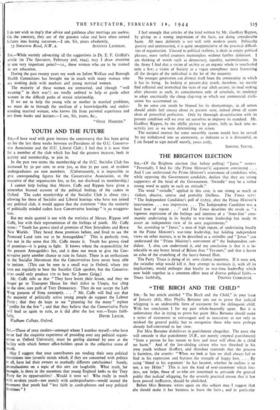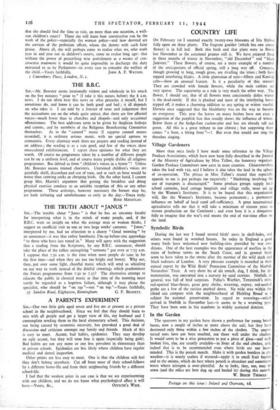THE BIRCH AND THE CHILD"
SIR,—In her article entitled "The Birch and the Child," in your issue of January 28th, Miss Phyllis Bottome sets out to prove that judicial whipping is an undesirable form of treatment for the delinquent child. With her conclusion I for my part whole-heartedly agree. But it is unfortunate that in trying to prove her point Miss Bottome should make a series of statements so extravagant and so inaccurate as not only to mislead the general public but to antagonise those who were perhaps already half-converted to her view.
For Miss Bottome disbelieves in punishment altogether. The most she will concede is that punishment (N.B., not merely corporal punishment) "from a person he has reason to love and trust will often do a child no harm." And of the law-abiding citizen who was thrashed in his own youth without ill-effect, and therefore 'contends that the process is harmless, she asserts: "When we look at him we shall always fail to find in his expression and features the strength of happy love. . . . By using blood as his argument he has become, whether he realises it or not, a toy Hitler." This is just the kind of over-statement which hin- ders, not helps, those of us who are concerned to persuade the general public that judicial whipping, for the severely practical reason that it has been proved ineffective, should be abolished.
Before Miss Bottome writes again on this subject may I suggest that she should make it her business to learn the facts ; and in particular
that she should find the time to visit, on more than one occasion, a well- run children's court? There she will learn how constructive can be the work of the police—especially the women police—and how devoted are the services of the probation officer, whom she damns with such faint praise. Above all, she will perhaps come to realise what we, who work year in and year out in children's courts, came to realise long ago: that without the power of prescribing wise punishment as a means of con- structive treatment it would be quite impossible to discharge the duty entrusted to us by Parliament—in every case to consider the welfare of the child.—Yours faithfully, JOHN A. F. WATSON. 1 Canonbury Place, London, N. x.



























 Previous page
Previous page